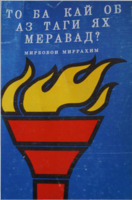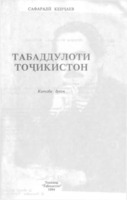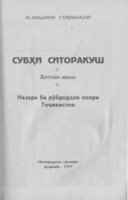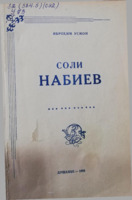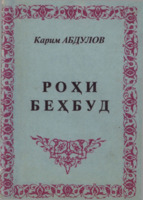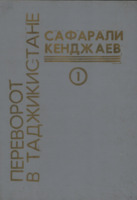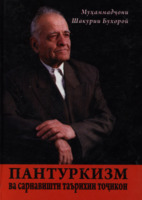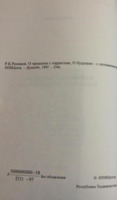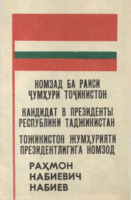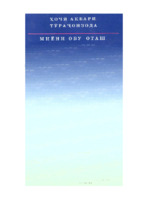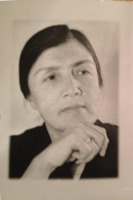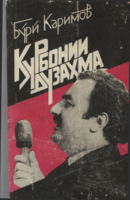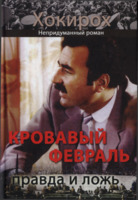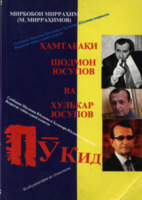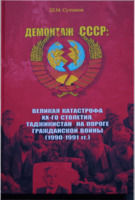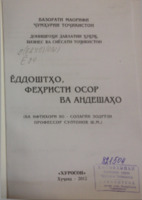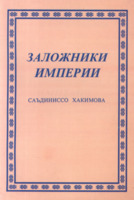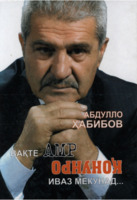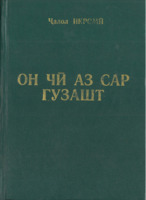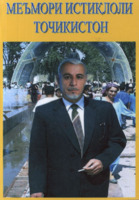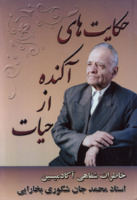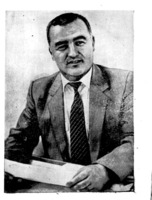Browse Documents (22 total)
То ба кай об аз таги ях меравад? How Long will the Water Keep Flowing Under the Ice?
From the publisher: Ман сулоли "То ба кай об аз таги ях меравад?"-ро баъд аз дахуним сол такрор мекунам ва боз рӯ ба ҷомеа меорам. Ин мақолаҳо натиҷаи заҳматҳои хоксоронаи муаллиф дар роҳи худшиносии милиӣ мебошад. Ҳар яке аз онҳо боиси баҳсу вокунише дар ҷомаи Ҷумҳурӣ қарор гирифтаанд ва гувохи онанд, ки ин талошҳо дар роҳи Озодӣ ва Истиқлоли кишвар фаро расид.
Mirboboi Mirrahim (Mirbobo MIrrahimov) is a translator and expert in pre-Islamic religions. During perestroika, he became famous for his writings on the Tajik language and was one of the first writers to publicly discuss the status of Samarqand and Bukhara. He also became one of the cofounders of Rastokhez, Tajikistan's first independent political organization. This memoir, published during Mirrahim's exile in Iran, reprints a series of his articles, along with commentary and critique of the work of others.
Табаддулоти Тоҷикистон: Иборат аз се китоб (қ. 2)
A Coup in Tajikistan (3 vols.)
Safarali Kenjaev (1942-1999) was a Soviet-era lawyer and prosecutor who rose to prominence in 1990-1991 as a critical voice in the Tajik Supreme Soviet and later as Chairman of the Supreme Soviet in 1991-1992. During the Tajik Civil War, Kenjaev became a leader of the pro-government "People's Front" that retook Dushanbe from the opposition in October-December 1992. This is volume two of Safarali Kenjaev's extended memoir about the collapse of the USSR and the Tajik Civil War.
Субҳи ситоракуш The Dawn That Puts Out the Stars
From the publisher: Хулоса, таҳлил ва натиҷабардориҳои муаллиф аз воқеъаҳои охири Тоҷикистон. Ин китоб барои оммаи васеъи хонандагон, хусусан сиёсат-мадорон, таърихнависон ва барои онҳое, ки дар роҳи маърифати худшиносии милиӣ мекушанд, навишта шудааст.
Asliddin Sohibnazar (1939 - ?) was a Soviet-era economist who worked in the Tajik SSR's planning agencies. During perestroika he became an opposition politician, and in 1991 was Davlat Khudonazarov's vice-presidential candidate. This memoir describes the last years of the USSR and Sohibnazar's time in politics, as well asides that extend forward and backwards in time.
Соли Набиев The Year of Nabiev
Ibrahim Usmonov (1948-) is a professional journalist and professor of journalism; in 1991 he became one of Rahmon Nabiev's close advisors. His memoir is dedicated to the approximately one year of Nabiev's presidency, from November 1991 to November 1992.
Роҳи беҳбуд The path of improvement
From the publisher: «Рохи бехбуд» манмӯаи хотирот ва маколоти ҷомеашинос, иқтисоддон ва олими шинохтаи тоник - профессор Карим Абдулов мебошад.
Karim Abdulov (1939-2010) was a Komsomol and Tajik Communist Party functionary in the 1970s and 1980s. As a protege of Rahmon Nabiev, he was forced out of the Tajik Party apparatus in 1988, whereupon he took up an academic career. His memoir covers his years in the Tajik Communist Party leadership, as well as the events of perestroika.
Переворот в Таджикистане
A Coup in Tajikistan
From the publisher: Автором книги «Переворот в Таджикистане» является бывший председатель Верховного Совета Республики Таджикистан Сафарали Кенджаев. В ней освещается одна из трагических страниц — трагедия, пережитая таджикским народом в результате гражданской войны. Автор стремится раскрыть причины и последствия происшедших событии, показывает истинных виновников этой трагедии таджикского народа — исламских экстремистов, религиозных фанатиков и людей, поверивших их пропаганде. Книга рассчитана на широкий круг читателей.
Safarali Kenjaev (1942-1999) was a Soviet-era lawyer and prosecutor who rose to prominence in 1990-1991 as a critical voice in the Tajik Supreme Soviet and later as Chairman of the Supreme Soviet in 1991-1992. During the Tajik Civil War, Kenjaev became a leader of the pro-government "People's Front" that retook Dushanbe from the opposition in October-December 1992. This memoir is focused on the period of the civil war and the year that preceeded it, with some attention given to earlier events.
Пантуркизм ва сарнавишти таръихии Тоҷикистон
Panturkism and the Rewriting of Tajik History
From the publisher: Китоби нави олими маъруф, академик Муҳаммадҷони Шакурии Бухороӣ «Пантуркизм ва сарнавишти таърихии тоҷикон» рисолаи «Фитнаи инқилоб дар Бухоро» ва силсиланигоштаҳои солҳои гуногуни муаллифро дар бар мегирад, ки посухест ба даъвоҳои бузургманишии олимону адибон, сиёсатмадорону фарҳангиёни туркгаро ва таҳрифгарони забону адабиёт ва таърихи фарҳанги тољик дар давраҳои гуногуни замони шуравӣ.
Muhammadjon Shakuri (Shakurov) (1924-2012) was a Tajik philologist and academician. He studied at the pedagogical institute in Dushanbe and later earned his kandidatskaia and doktorskaia degrees at the Institute of World Literature in Moscow. His professional home, however, remained the Rudaki Institute of Language and Literature in Dushanbe. In the late 1980s he became a leading figure in the campaign for the primacy of the Tajik language. This memoir revisits episodes from the late Soviet period related to perestroika and the reconsideration of the Soviet past, including the status of Samarqand and Bukhara. It also reproduces contemporary documents.
О прошлом с гордостью, о будущем с оптимизмом With pride about the past and optimism about the future.
Rashid Karimov (1932-) is a Tajik economist who spent 30 years as the head of the Institute of Economics of the Tajik SSR Academy of Sciences in Dushanbe. He played a leading role in the key economic debates of that period, as well as in organizing the research behind policy proposals adopted at the state level. This memoir covers his childhood outside of Leninobod (Khujand), his education in the post-war years, eventual graduate work in Moscow, and time in the institute. It also recounts stories about his family, including his sister I. R. Rakhimova, a leading party official.
Номзад ба раиси ҷумҳури Тоҷикистон Candidate for the leader of the Republic of Tajikistan
Rahmon Nabiev (1930-1993) was a Tajik governemnt official and political. This is a campaign brochure produced by the supporters of Rahmon Nabiev as part of his campaign for President of the Republic of Tajikistan in November 1991. It includes a brief biographical sketch, as well as a description of Nabiev's policies.
Миёни обу оташ Between Water and Fire
From the publisher: Ин китоб хотироти муҷаз ва мухтасари Қозидомулло‐Ҳоҷӣ Акбари Тураҷонзода фақат аз боби воқеаҳои асосии пойиз (тирамоҳ)‐и соли 1991 ва баҳори соли 1992 то таъсиси Ҳукумати Муросои Миллӣ дар Тоҷикистон мебошад. Муаллиф бо самимият ва ошкоро аз ҳаводиси шуми он солҳо ва чеҳраҳои ҳақиқии коргардонҳои аслии гирдиҳамоиҳои Майдонҳои Шаҳидон ва Озодӣ парда бармедорад.
Hoji Akbar Turajonzoda (1954- ) was the influential "Qazi Kalon" or Chief Mufti of the Tajik SSR during perestroika. In 1991 and 1992 he sided with the opposition forces challenging Rahmon Nabiev's government; this short memoir covers the period of time between fall 1991 and the spring of 1992.
Маткаби ман My School
From the publisher: Дар китоб мақола, очерк ва дигар эҷодҳои солҳои гуногуни муаллиф ҷамьоварӣ шудаанд. Асарҳои саргузашт ва мутоибоз бори аввал чоп мешаванд.
Munzifa Gafforova (1924-2013) was a philosopher and educator who served as rector of the Pedagogical Institute in Dushanbe from 1977-1988. Gafforova studied chemistry at the Kirov Pedagogical Institute in Leninabad, and by 18 was already working as an instructor there. She became a Komsomol activist, and by 1947, at the age of 23, was named head of women’s section of the Central Committee of the Communist Party of Tajikistan. Later she completed two graduate degrees, becoming a Doctor of Sciences in Philosophy. This volume includes her recollections of study, graduate work in Moscow, her reflections on gender (in)equality in the Soviet period and after, and her experience as rector.
Курбонии дузахма
Victim of the Double Blow
From the publisher: Бӯрӣ Каримови на факат дар Точикистон, балки дар собиқ Иттиҳоди Шӯравй машҳур дар ин китоб дойр ба сабабу окибатқои ҳодисаҳои баҳманмоқ, дасисабозию нотавонбинии баъзе аз хукуматдорон, чй туна сурат гирифтанн се пленуми хизби коммунист дар он рӯзҳо бо дарду алам ва дар айни замон бо мухокимаронии мантикан солим кисса пардохтааст. Балки ин китоб сарнавишти пурмочарои худи ӯ ва халқи ӯст.
Buri Karimov (1958-) was a government minister in the Tajik SSR in the mid to late 1980s, reaching the post of Chairman of the State Planning Committee (Gosplan Tajik SSR) by 1989. Famous for becoming the youngest minister in the USSR at age 28 in 1987, Buri Karimov was an ambitious and charismatic late Soviet Tajik politician. He reached the post of republican Gosplan chairman in 1989, but fell out of favor and lost his Party and government positions in 1990 as a result of the February 1990 riots in Dushanbe. This memoir partly describes his political career before and after 1990, but is largely focused on the riots themselves.
Кровавый февраль
Bloody February
From the publisher: В этой книге речь пойдет о причинах и последствиях кровавых событий февраля 1990 года в Душанбе, о трех пленумах ЦК Компартии Таджикистана, которые прошли один за другим и не ответили на вопросы народа, и о том, как тяжело расставался с властью триумвират таджикских руководителей и как подстрелили они на взлете одного молодого и перспективного члена правительства. Автор попытался максимально достоверно исследовать причины, приведшие к чудовищной народной трагедии, и понять, почему все-таки случилось так, что ее кровавые плоды не стали уроком для будущего. Книга приурочена к 25-летию трагических событий и посвящена невинно погибшим в этой необъявленной войне с собственным населением.
Buri Karimov (1958-) was a government minister in the Tajik SSR in the mid to late 1980s, reaching the post of Chairman of the State Planning Committee (Gosplan Tajik SSR) by 1989. Famous for becoming the youngest minister in the USSR at age 28 in 1987, Buri Karimov was an ambitious and charismatic late Soviet Tajik politician. He reached the post of republican Gosplan chairman in 1989, but fell out of favor and lost his Party and government positions in 1990 as a result of the February 1990 riots in Dushanbe. He became famous for his involvement in the "February riots," which almost toppled the leadership of the republic. This memoir is exclusively focused on those events and provides extensive detail on Karimov's side of the story.
Ҳамтабаки Шодмон Юсупов ва Хулькар Юсупов ПӮКИД.
The Union of Shodmon Yusuf and Khulkar Yusupov has come Undone
From the publisher: Ҳеҷ гоҳ бо чунин дилгарми дар навиштани посухе capгарм нашуда будам, чуноне ки дар як моҳи пас аз Наврӯзи соли 2011. Зеро ҳамин даҳ-понздаҳ соли ахир чандин китоб ва садҳо мақола дар мукобили андеша ва шахсияти Мирбобои Мирраҳим (Мирраҳимов) ба нашр расида, ки аксари онҳо қобили накд ва посух нестанд, аммо дурӯғпароканӣ ва тӯҳматномаи С. Мирзорахматов аз ҷинси дигар аст. Дар мавриди навиштаҳои С. Мирзорахматов метавон танҳо бо ибораи хеле зебои Ибни Ҳуққал (Ҳавқал) ифодаи матлаб кард, ки барҳақ дар сурату сирати ин қабил бузургворон мефармояд: «ишон пойбанд ба фазоили ахлоқӣ нестанд ва дар касби разоил бисёр ҳарисанд». Ба ҳар ҳол дурӯғпароканиҳои ҷаноби С. Мирзорахматов, боне шуд, ки дар посухҳо бо бурҳони қотеъ парда аз чеҳраи ҳақиқии он кас бардошта, шахсияти яке аз коргардонони асосии фоҷиаҳои хунини моҳи феврали соли 1990 барои касби мақоми аввал дар Тоҷикистонро дақиқ нишон дода, бисёр дигар иттилоот ва далелҳо дар боби таърихи худшиносии миллии тоҷикон ва умуман таърихи навин мисол оварда шавад, ки то ба ҳол аксарият аз онҳо огоҳ набуданд ва ё бархе аз таре ва барқасд аз онҳо иҷтиноб меварзиданд...
Mirboboi Mirrahim (Mirbobo MIrrahimov) is a translator and expert in pre-Islamic religions. During perestroika, he became famous for his writings on the Tajik language and was one of the first writers to publicly discuss the status of Samarqand and Bukhara. He also became one of the cofounders of Rastokhez, Tajikistan's first independent political organization.et and writer; during perestroika he was one of the founders of Rastokhez, Tajikistan's first independent political organization. He later was involved in the brief opposition-led government that controlled Dushanbe between May and November 1992. This work comprises a combination of memoir-like sketches of the late 1980s and early 1990s, as well as polemics directed at those rival politicians and authors that Mirrahim believes to have misrepresented fact in their own published works.
Mirboboi Mirrahim (Mirbobo MIrrahimov) is a translator and expert in pre-Islamic religions. During perestroika, he became famous for his writings on the Tajik language and was one of the first writers to publicly discuss the status of Samarqand and Bukhara. He also became one of the cofounders of Rastokhez, Tajikistan's first independent political organization.et and writer; during perestroika he was one of the founders of Rastokhez, Tajikistan's first independent political organization. He later was involved in the brief opposition-led government that controlled Dushanbe between May and November 1992. This work comprises a combination of memoir-like sketches of the late 1980s and early 1990s, as well as polemics directed at those rival politicians and authors that Mirrahim believes to have misrepresented fact in their own published works.
Демонтаж СССР The Demolition of the USSR
From the publisher: Эта книга о пережитом, о социальной драме, разыгравшейся 20 лет тому назад в Таджикистане, о природе так называемого таджикского ГКЧП, ставшего причиной неистовой антикоммунистической истерии демократов и исламских фундаменталистов, представляющих уникальный симбиоз новой объединённой оппозиции. Эта монография - размышления о трагической судьбе великой державы, неразрывной частью был Таджикистан, переставший существовать в силу двурушничества, предательства, измены, деструктивной деятельности части национальной интеллигенции.
Shukur Sultanov (1932- ) is a historian, and former deputy director of the Institute of Party History of the Communist Party of Tajikistan. In the late 1980s, he was also Minister of Higher Education of the Tajik SSR. This work is a mix of memoir and historical discourse, covering the 1980s and the collapse of the USSR.
Ёддоштҳо, феҳристи осор, ва андешаҳо Memories, Events, and Signs of the Times
Shukur Sultanov (1932-) is a historian, and former deputy director of the Institute of Party History of the Communist Party of Tajikistan. In the late 1980s, he was also Minister of Higher Education of the Tajik SSR. This mixed Tajik/Russian language memoir includes his own recollections and those about him.
Заложники империи Hostages of Empire
From the publisher: Автор документально показывает планомерное уничтожение таджикского этноса, которое достигло необычайного размаха в Узбекистане, населенном, главным образом, таджиками, и в самом Таджикистане в послевоенные годы при негласной поддержке ЦК КПСС и Союзного правительства.
Sa''diniso Hakimova (1924-2015) was a Tajik surgeon, professor, and director of the Tajik SSR Ministry of Health Research Institute for the Protection of Mothers and Children. She was one of the first Tajik women to earn a medical degree (in 1943), and later the first to write a dissertation for a Doctorate of Medicine, which she defended in 1958. Her experience working on maternal and child health in Tajikistan led her to be increasingly critical of the public health system. Eventually, she came to subscribe to some of the more nationalistic theories that gained currency on the eve of the Soviet collapse, blaming public health issues on a concerted campaign of genocide carried out by Uzbeks with the tacit support of the Soviet government. This volume nevertheless contains valuable insights into the workings of the health system in the Tajik SSR, as well as documentary sources from the author’s personal archive.
Вақте амр қонунро иваз мекунад. The Times When Life Changes Law
From the publisher: Дар ин китоб мақола ва мусоҳибаҳои матбуотии Ҳабибов Абдулло Ҳабибович гирд омадаанд, ки хонандаро бо воқеияти таърихи на чандон дури ҳаёти ҷомеаи Тоҷикистон ошно мекунанд.
Abdullo Habibov (1940-) was a Soviet Party worker, educated in Tajikistan and in Moscow, where he attended the Academy of Social Sciences of the CC CPSU and received the degree of Candidate of Historical Sciences. In the 1980s he was appointed the head of the "Political Section" of the Tajik Ministry of the Interior. He later came to prominence during the February 1990 riots in Dushanbe, when he supported Buri Karimov and the massed protestors. This volume collects a series of his writings about the late Soviet period and a number of explicatory interviews.
Он чӣ аз саргузашт
The stuff of memoirs
From the publisher: Ин китоби охирини Ҷалол Икромӣ мебошад. Нависанда дар бораи солҳои наврасиаш, хешу табораш, революсияи сосиалистии Бухоро ва сарнагун шудани республикаи сосиалистии Бухоро, тараққиёт ва сабзиши республикаи сосиалистии Тоҷикистон сухан меронад. Саҳифаҳои зиёде ба солҳои мудҳиши 1937-39 бахшида шудааст.
Jalol Ikromi (1909-1993) was one of Soviet Tajikistan's most famous writers. This memoir covers his childhood in Bukhara as well his eventual move to Stalinabad (Dushanbe). A substantial portion of the memoir is devoted to the effect of the great terror on his own family and on the intelligentsia more generally. The final pages contain his reflections on Perestroika and the collapse of the USSR.
Меъмори истиқлоли Тоҷикистон Architect of Tajikistan's Independence
From the publisher: Хонандаи гиромӣ, китобе, ки дар даст дорӣ, маҷмӯаест, аз навиштаҳои донишмандон ва журналистони шинохтаи кишвар аз рӯзгор ва пайкори шахсияти мубориз ва донишманду маорифпарвари машҳур Тоҳири Абдуцаббор, ки ба ҳангоми беморӣ ва даргузашти ин абармарди Тоҷикистон бунёдгузори эҳёи истиқлол ва мақоми расмии забони форсим тоҷикй дар замони нав ба табъ расидааст. Хамчунин дар ин маҷмӯа чанде аз навиштаҳои ин донишманд барои нахустин бор дар шакли маҷмӯа ба дам оварда шудааст.
Tohir Abdujabbor (1946-2009) is best known as the founder of Rastokhez (Rebirth), the first independent political organization in Tajikistan, which campaigned for the primacy of the Taiik language, greater political and economic autonomy and, eventually, independence. Abdujabbor trained as an economist, earning his kandidatskaia degree at the Institute of Oriental Studies in Moscow with a dissertation on Pakistan; he later served as an economic adviser and translator in Afghanistan. During the civil war he fled first to Tehran, later settling in Bishkek before returning to Tajikistan in 2005. Unfortunately, he did not leave behind any memoirs. This volume includes some insightful reminiscences about Abdujabbor by his former colleagues and associates, as well as some his key writings from the late Soviet period and beyond.
حکایتها آکنده از حیات Stories full of life
Muhammadjon Shakuri (Shakurov) (1924-2012) was a Tajik philologist and academician. He studied at the pedagogical institute in Dushanbe and later earned his kandidatskaia and doktorskaia degrees at the Institute of World Literature in Moscow. His professional home, however, remained the Rudaki Institute of Language and Literature in Dushanbe. In the late 1980s he became a leading figure in the campaign for the primacy of the Tajik language. This volume, published in the Arabic/Persian script with the support of the Iranian Embassy in Dushanbe, includes accounts of raising Tajik-speaking children in a mixed family (his wife was Russian), his experience studying for a graduate degree, and his perestroika-era activism.
Таркиш The Explosion
From the publisher: Яке аз ходимони барҷастаи сиёсӣ ва давлатӣ Ҳоҷи Ҳикматулло Насреддин (Насреддинов) китоби хотироти худро “Таркиш” номгузорӣ кардааст. Китоб марҳалаҳои гуногуни кору мушоҳидаҳои муаллифро дар сохтори ҳизбию давлатӣ ва тариқи роҳбариро дар ҷумҳурӣ дарбар мегирад.
Hikmatullo Nasreddinov (1939-) was a leading Tajik politician in the early 1980s and a protege of Rahmon Nabiev, the First Secretary of the Communist Party of Tajikistan from 1982 to 1985. Nasreddinov's memoir touches on the 1970s and early 1980s, but is largely focused on the final years of the USSR and the start of the Tajik Civil War in 1992, which he blames on the political course taken by Kahhor Mahkamov in the late 1980s.
